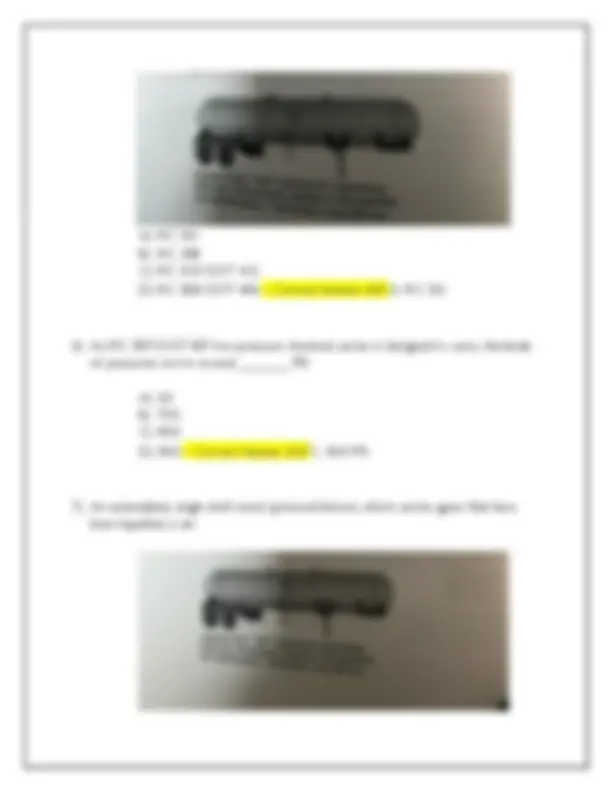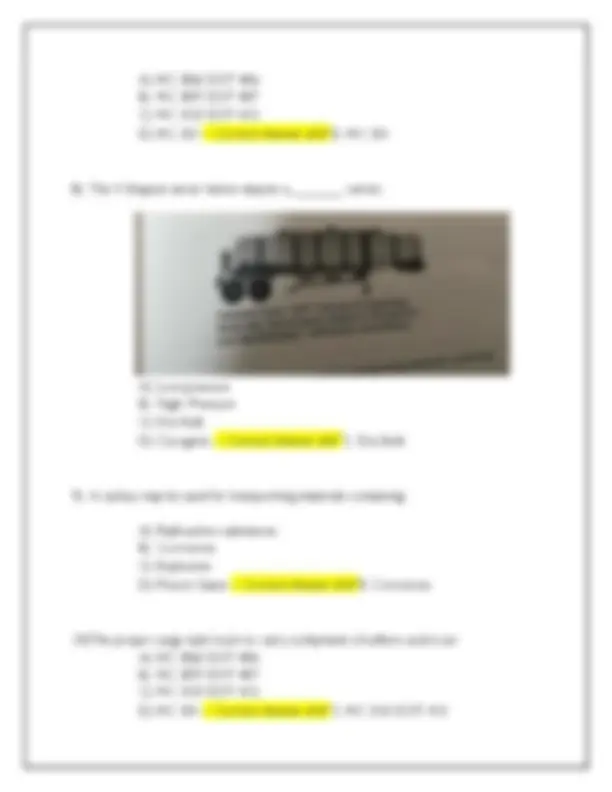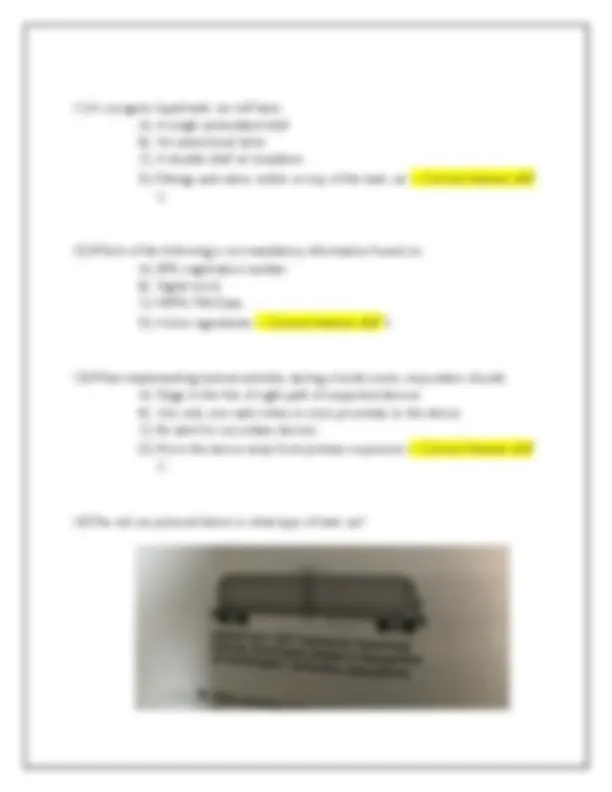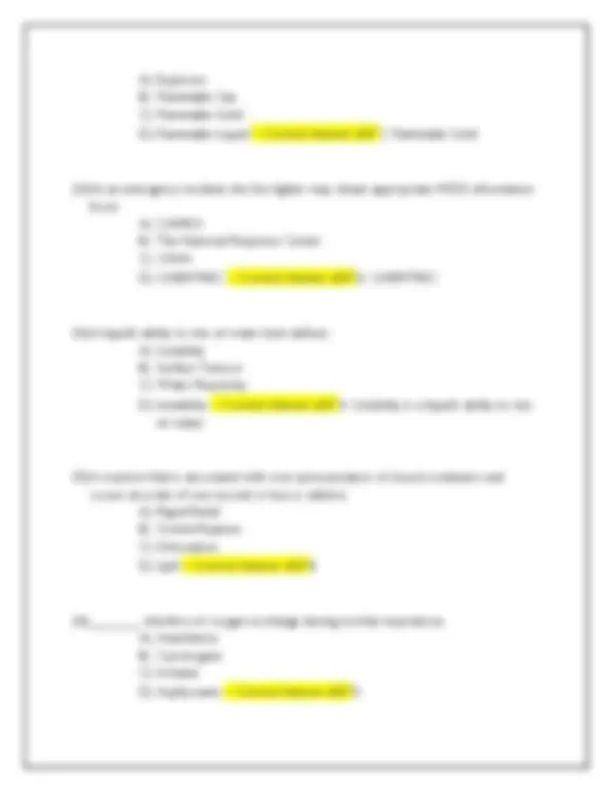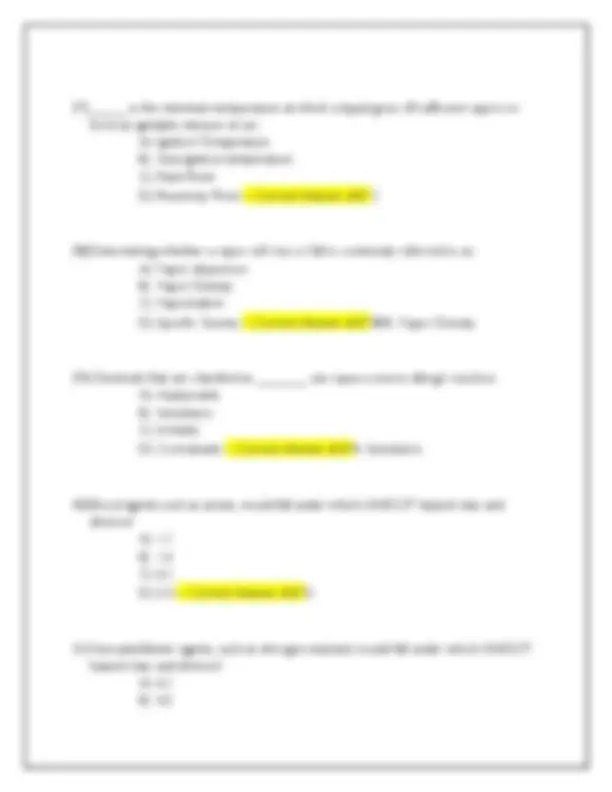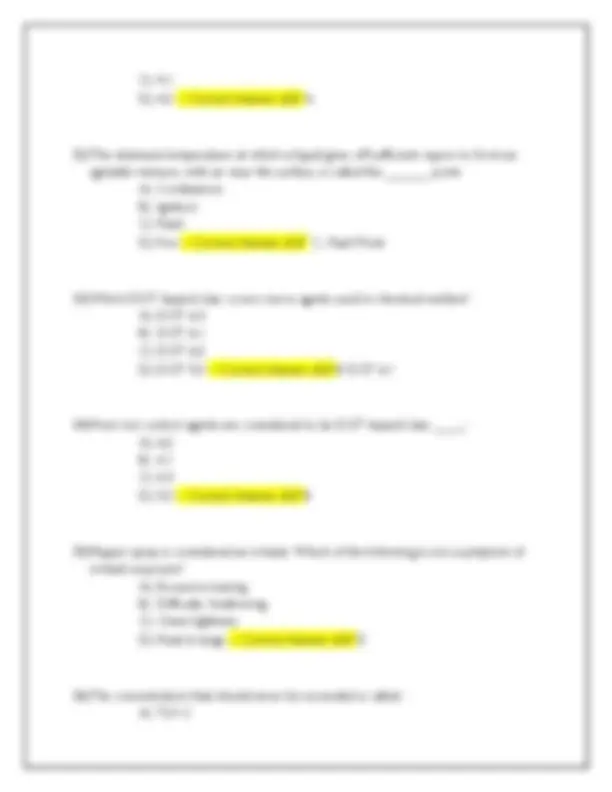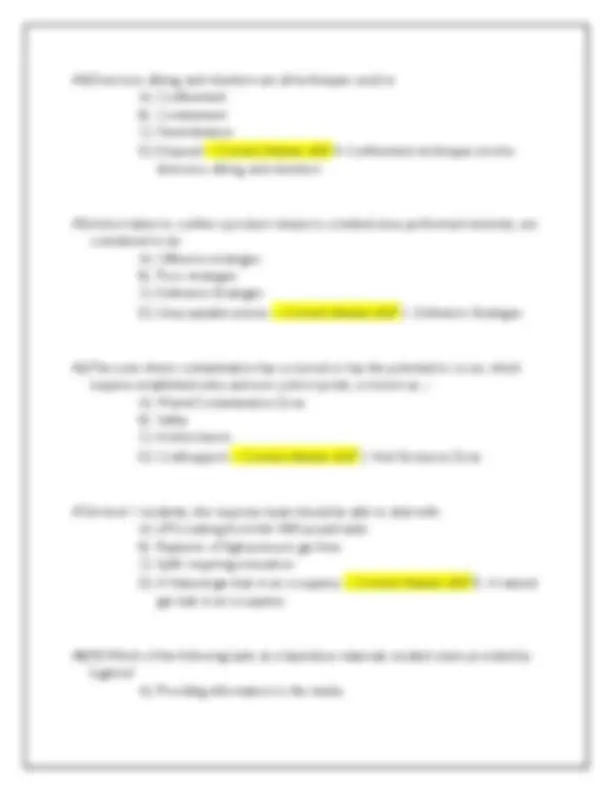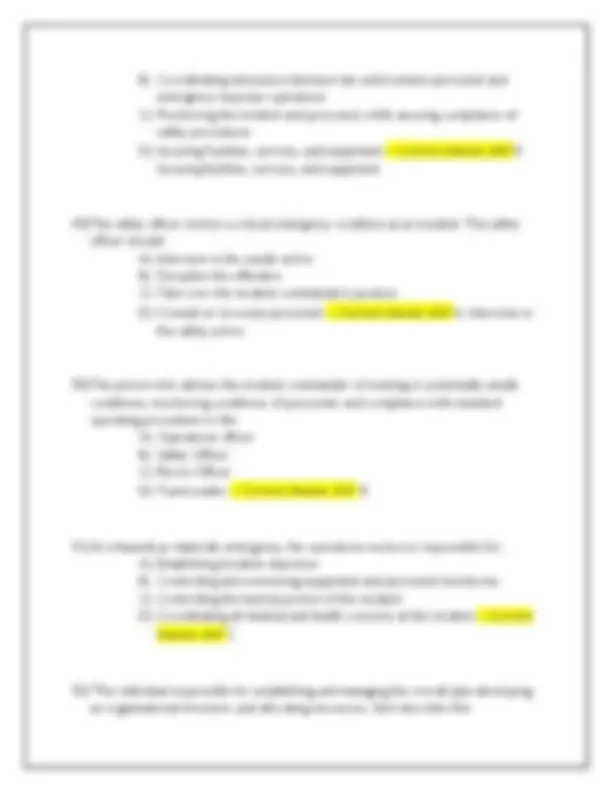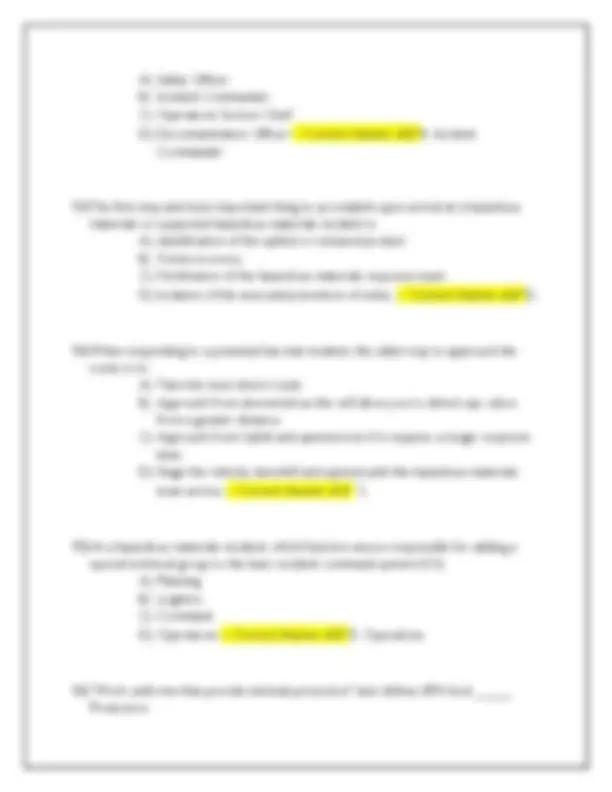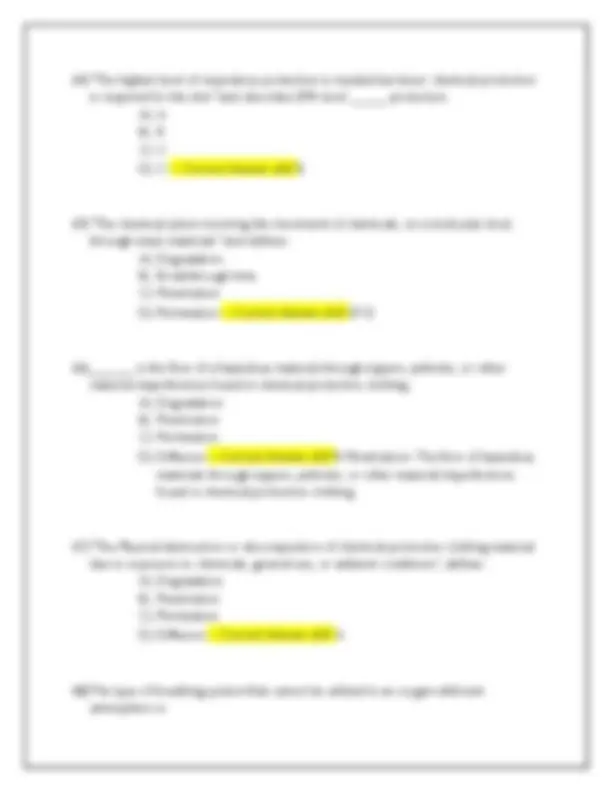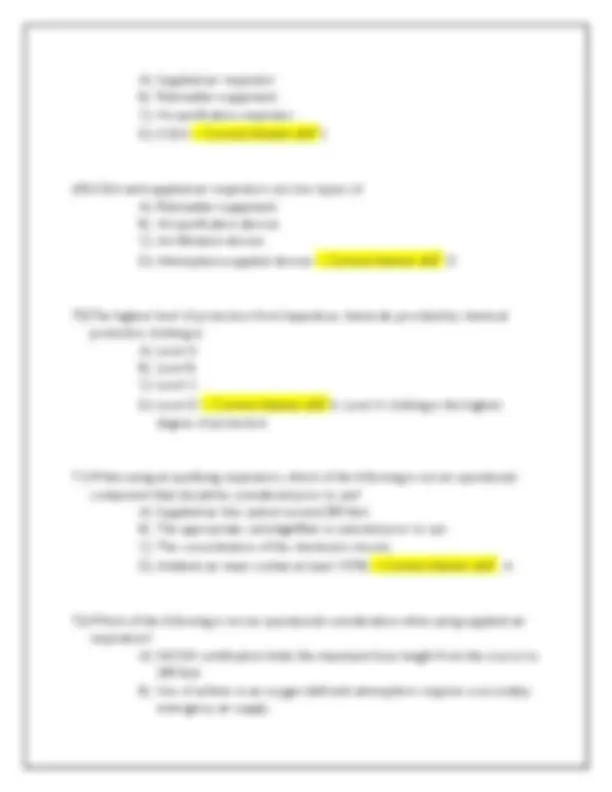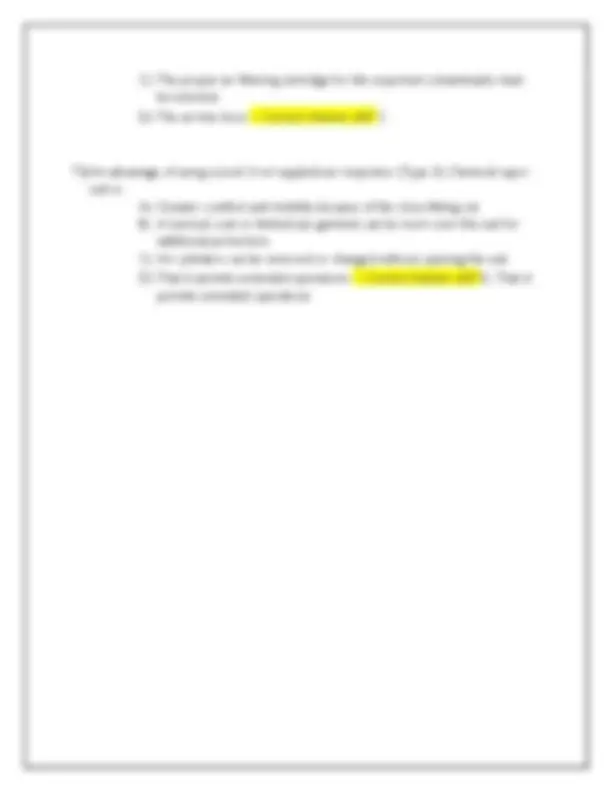Download HAZMAT PHASE II-I EXAM QUESTIONS WITH ACCURATE SOLUTIONS and more Exams Engineering in PDF only on Docsity!
HAZMAT PHASE II-I EXAM QUESTIONS WITH ACCURATE
SOLUTIONS
- The Piping for the ____ is contained outside of the tank, usually on the ends, w/ a manhole on top of the tank A) IM 101 B) IM C) IM 105 D) IM 107 -- Correct Answer ✔✔ B IM 102
- The statement, "Keep away from waterways" is found on a pesticide label. This statement is referred to as a/an: A) Signal Word B) Hazard Statement C) Pest Control Product Warning D) Incompatibility statement -- Correct Answer ✔✔ B Hazard Statement
- The vehicle pictured below is an:
A) MC 331
B) MC 338
C) MC 312/ DOT 412
D) MC 306/ DOT 406 -- Correct Answer ✔✔ C. MC 312/ DOT 412
- A recon team is sent to observe a tank truck that has rolled over. The team reports that the vehicle is an MC 312. The container most likely contains a ... A) Flammable Liquid B) Corrosive Liquid C) Poison Gas D) Flammable Solid -- Correct Answer ✔✔ B. Corrosive Liquid
- In response to an incident involving a jack-knife tractor trailer, you arrive and size up the situation. From your position, you only have a side view of the tractor, you know it is an:
A) MC 306/ DOT 406
B) MC 307/ DOT 407
C) MC 312/ DOT 412
D) MC 331 -- Correct Answer ✔✔ D. MC 331
- The V-Shaped carrier below depicts a _______ carrier. A) Low-pressure B) High- Pressure C) Dry Bulk D) Cryogenic -- Correct Answer ✔✔ C. Dry Bulk
- A carboy may be used for transporting materials containing: A) Radioactive substances B) Corrosives C) Explosives D) Poison Gases -- Correct Answer ✔✔ B. Corrosives
- The proper cargo tank truck to carry a shipment of sulfuric acid is an: A) MC 306/ DOT 406 B) MC 307/ DOT 407 C) MC 312/ DOT 412 D) MC 331 -- Correct Answer ✔✔ C. MC 312/ DOT 412
- A cryogenic liquid tank car will have: A) A single uninsulated shell B) An unenclosed done C) A double shell w/ insulation D) Fittings and valves visible on top of the tank car -- Correct Answer ✔✔ C
- Which of the following is not mandatory information found on: A) EPA registration number B) Signal word C) NFPA 704 Data D) Active ingredients -- Correct Answer ✔✔ C
- When implementing tactical activities during a bomb event, responders should: A) Stage in the line of sight path of suspected devices B) Use only one radio when in close proximity to the device C) Be alert for secondary devices D) Move the device away from primary exposures -- Correct Answer ✔✔ C
- The rail car pictured below is what type of tank car?
D) Only statement 2 is correct. -- Correct Answer ✔✔ C. Statements 1 and 3 are correct
- The design pressure of an IM 101 Portable tank is: A) 14.5 PSI to 25.4 PSI B) 100 to 500 PSI C) 25.4 to 100 PSI D) 6.89 to 14.5 PSI -- Correct Answer ✔✔ C.
- An Intermodal container that is capable of holding high-pressure gases 3000 PSI or higher is a: A) Cryogenic Intermodal Tank B) Tube Module intermodal container C) Pressurized intermodal tank D) Non-pressurized intermodal tank -- Correct Answer ✔✔ B
- Cylindrical packaging made of metal, plastic, or fiberboard used to transport solids or liquids best describes: A) Carboys B) Drums C) Pressurized Cylinders D) Bins -- Correct Answer ✔✔ B. Drums
- In the UN/DOT system, a container labeled w/ a hazard classification of 3 includes: A) Black Powder B) Gasoline C) Ammonium Nitrate D) Magnesium -- Correct Answer ✔✔ B
- Within the UN/DOT system, a container labeled W/ a hazard classification of 4 contains a/an:
A) Explosive B) Flammable Gas C) Flammable Solid D) Flammable Liquid -- Correct Answer ✔✔ C Flammable Solid
- At an emergency incident, the fire fighter may obtain appropriate MSDS information from: A) CAMEO B) The National Response Center C) OSHA D) CHEMTREC -- Correct Answer ✔✔ D. CHEMTREC
- A liquid's ability to mix w/ water best defines: A) Solubility B) Surface Tension C) Water Reactivity D) Instability -- Correct Answer ✔✔ A. Solubility is a liquid's ability to mix w/ water
- A reaction that is associated with over-pressurization of closed containers and occurs at a rate of one second or less is called a: A) Rapid Relief B) Violent Rupture C) Detonation D) Spill -- Correct Answer ✔✔ B
- _______ interfere w/ oxygen exchange during normal respirations. A) Anesthetics B) Carcinogens C) Irritants D) Asphyxiants -- Correct Answer ✔✔ D.
C) 4.
D) 4.2 -- Correct Answer ✔✔ A.
- The minimum temperature at which a liquid gives off sufficient vapors to form an ignitable mixture, with air near the surface, is called the ______ point. A) Combustion B) Ignition C) Flash D) Fire -- Correct Answer ✔✔ C. Flash Point
- Which DOT hazard class covers nerve agents used in chemical warfare? A) DOT 6. B) DOT 6. C) DOT 6. D) DOT 5.2 -- Correct Answer ✔✔ B DOT 6.
- Most riot control agents are considered to be DOT hazard class ____: A) 6. B) 6. C) 6. D) 5.2 -- Correct Answer ✔✔ B
- Pepper spray is considered an irritant. Which of the following is not a symptom of irritant exposure? A) Excessive tearing B) Difficulty Swallowing C) Chest tightness D) Fluid in lungs -- Correct Answer ✔✔ D
- The concentration that should never be exceeded is called: A) TLV-C
B) PEL
C) TLC-TWA
D) STEL -- Correct Answer ✔✔ A
- The measurement commonly used by OSHA in evaluating workplace exposure during an 8 hour period is called: A) PEL B) LC₅ 0 C) TLV-C D) STEL -- Correct Answer ✔✔ A. PEL
- Which of the following resources are available for determining he concentrations of a released hazardous material in an endangered area? A) Concentrations can be estimated using the ERG B) Monitoring equipment should be utilized, keeping in mind that hazardous materials technicians are needed to operate this equipment C) It is impossible to determine concentrations of hazardous materials D) Concentrations can be estimated by the odor of the leaking product -- Correct Answer ✔✔ B
- Which is correct?
- Remote shutoffs are usually well marked and in an easy-to-find location.
- Remote shutoffs in fixed facilities are typically located near the entrance.
- On vehicles, the two most common locations for remote shutoffs are at the valve controls and behind the driver's door. A) Statement 1 is correct B) Statement 1 and 2 are correct C) Statement 2 and 3 are correct D) All 3 statements are correct -- Correct Answer ✔✔ D
- Which of the following is not an appropriate procedure or consideration before applying foam?
- Diversion, diking, and retention are all techniques used in: A) Confinement B) Containment C) Neutralization D) Disposal -- Correct Answer ✔✔ A Confinement techniques involve diversion, diking, and retention
- Action taken to confine a product release to a limited area, performed remotely, are considered to be: A) Offensive strategies B) Poor strategies C) Defensive Strategies D) Unacceptable actions -- Correct Answer ✔✔ C. Defensive Strategies
- The zone where contamination has occurred or has the potential to occur, which requires established entry and exit control points, is known as...: A) Warm/Contamination Zone B) Safety C) Hot/exclusion D) Cold/support -- Correct Answer ✔✔ C Hot/ Exclusion Zone
- In level 1 incidents, the response team should be able to deal with: A) LPG Leaking from full 1000 pound tanks B) Ruptures of high-pressure gas lines C) Spills requiring evacuation D) A Natural gas leak in an occupancy -- Correct Answer ✔✔ D. A natural gas leak in an occupancy
- 50.Which of the following tasks at a hazardous materials incident is/are provided by logistics? A) Providing information to the media
B) Coordinating interaction between law enforcement personnel and emergency response operations C) Monitoring the incident and personnel, while assuring compliance w/ safety procedures D) Securing Facilities, services, and equipment -- Correct Answer ✔✔ D Securing facilities, services, and equipment
- The safety officer notices a critical emergency condition at an incident. The safety officer should: A) Intervene in the unsafe action B) Discipline the offenders C) Take over the incident commander's position D) Consult w/ on-scene personnel -- Correct Answer ✔✔ A. Intervene in the safety action
- The person who advises the incident commander of existing or potentially unsafe conditions, monitoring conditions of personnel, and compliance with standard operating procedures is the: A) Operations officer B) Safety Officer C) Recon Officer D) Team Leader -- Correct Answer ✔✔ B
- At a hazardous materials emergency, the operations section is responsible for: A) Establishing Incident objectives B) Controlling and overseeing equipment and personnel inventories C) Controlling the tactical portion of the incident D) Coordinating all medical and health concerns at the incident -- Correct Answer ✔✔ C
- "The individual responsible for establishing and managing the overall plan developing an organizational structure ,and allocating resources,: best describes the:
A) A
B) B
C) C
D) D -- Correct Answer ✔✔ D
- The type of breathing that cannot be utilzied in an oxygen-deficient atmosphere is a/an: A) Supplied-air respirator B) Rebreather Equipment t C) Air-purification respirator D) SCBA -- Correct Answer ✔✔ C
- Dizziness, headache, nausea, vomiting, diarrhea, and decreased urine output are all signs of: A) Heat stroke B) Heat cramps C) Heat exhaustion D) Both B and C are correct -- Correct Answer ✔✔ C
- Which is correct?
- Heat exhaustion occurs because the body is unable to dissipate excessive heat and becomes overheated.
- Heat stroke results from the failure of the temperature regulating capacity of the body
- Both heat exhaustion and heat stroke are immediate life-threatening conditions A) All 3 statements are correct B) Statement 1 is correct C) Statement 1 and 2 are correct D) Statement 2 and 3 are correct -- Correct Answer ✔✔ C
- The following limitations are indicative of what type of chemical vapor suit?
SCBA is exposed to the atmosphere Face-piece compatibility may not be equivalent to suit compatibility Chemical compatibility of belts, straps, and harnesses may not be known. A) Level A, Fully encapsulating B) Level B SCBA Type 2 C) Level C (Type 3) D) Level D (Type 4) -- Correct Answer ✔✔ B SCBA is exposed to the atmosphere in Level B Hazmat Protective SUits
- The most critical parameter whens electing the appropriate level of chemical- protective equipment is: A) Flexibility B) Decontamination Abilities C) Available sizes D) Chemical compatibility -- Correct Answer ✔✔ D
- "The process by which a chemical enters a protective suit through openings in the garment" best describes: A) Degradation B) Breakthrough time C) Penetration D) Permeation -- Correct Answer ✔✔ C. Penetration- how a chemical enters a protective suit through openings in the garment
- The physical destruction or decomposition of chemical-protective clothing by a chemical action is called: A) Degradation B) Breakthrough Time C) Penetration D) Permeatin -- Correct Answer ✔✔ A. Degradation- physical destruction of chemical protective clothing
A) Supplied-air respirator B) Rebreather equipment C) Air-purification respirator D) SCBA -- Correct Answer ✔✔ C
- SCBA and supplied-air respirators are two types of: A) Rebreather equipment B) Air-purification devices C) Air-filtration devices D) Atmosphere-supplied devices -- Correct Answer ✔✔ D
- The highest level of protection from hazardous chemicals provided by chemical protective clothing is: A) Level A B) Level B C) Level C D) Level D -- Correct Answer ✔✔ A. Level A clothing is the highest degree of protection
- When using air-purifying respirators, which of the following is not an operational component that should be considered prior to use? A) Supplied-air line cannot exceed 300 feet B) The appropriate cartridge/filter is selected prior to use C) The concentration of the chemical is known D) Ambient air must contain at least 19.5% -- Correct Answer ✔✔ .A
- Which of the following is not an operational consideration when using supplied-air respirators? A) NIOSH certification limits the maximum hose length from the source to 300 feet B) Use of airlines in an oxygen-deficient atmosphere requires a secondary emergency air supply.
C) The proper air filtering cartridge for the expected contaminants must be selected. D) The air-line hose -- Correct Answer ✔✔ C
- An advantage of using a Level A w/ supplied-air respirator (Type 3) Chemical vapor suit is: A) Greater comfort and mobility because of the close-fitting cut B) A turnout coat or limited use garment can be worn over the suit for additional protection. C) Air cylinders can be removed or changed without opening the suit. D) That it permits extended operations -- Correct Answer ✔✔ D. That it permits extended operations

